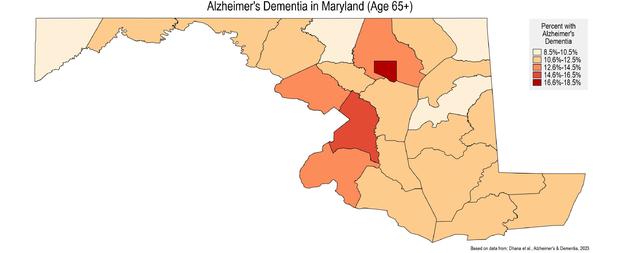Baltimore City among areas with highest Alzheimer's prevalence in U.S.
BALTIMORE - Baltimore City is among the areas with the highest prevalence of Alzheimer's dementia in the United States, according to a newly released study.
The first-ever county-level estimates of the prevalence of people with Alzheimer's were released Monday, July 17 at the Alzheimer's Association International Conference in Amsterdam.
Researchers used data from the Chicago Health and Aging Project and population estimates from the National Center for Health Statistics to estimate the prevalence of Alzheimer's in people 65 years and older in all of the nation's 3,142 counties, according to a press release from the association.
The study found the East and Southeastern U.S. have the highest prevalence of the disease.
The National Institutes of Health defines the disease as "a brain disorder that slowly destroys memory and thinking skills and, eventually, the ability to carry out the simplest tasks."
Baltimore City is tied for the highest prevalence rate in the nation for counties with a population of 10,000 or more people 65 or older. Prince George's County in Maryland follows close behind by less than a percentage point.
The researchers estimate the highest prevalence rates are in:
- Miami-Dade County, Fla. (16.6%)
- Baltimore City, Md. (16.6%)
- Bronx County, N.Y. (16.6%)
- Prince George's County, Md. (16.1%)
- Hinds County, Miss. (15.5%)
- Orleans Parish, La. (15.4%)
The prevalence rate for Baltimore County is 13.1%.
Researchers said the higher prevalence in these areas could be explained by demographics like older average age and higher percentages of Black and Hispanic residents.
The researchers were led by Dr. Kumar B. Rajan, a professor in the Department of Internal Medicine at Rush Medical College.
"These new estimates add more granular data to our understanding of Alzheimer's prevalence across the country," Rajan said in a statement. "This information, in addition to raising awareness of the Alzheimer's crisis in specific communities, may help public health programs better allocate funding, staffing and other resources for caring for people with Alzheimer's and all other dementia."
The NIH said there's no cure for the disease, but there has been recent progress in developing and testing new treatments. Last week the U.S. Food and Drug Administration granted traditional approval to the Alzheimer's drug Leqembi.
This is a developing story and will be updated.








